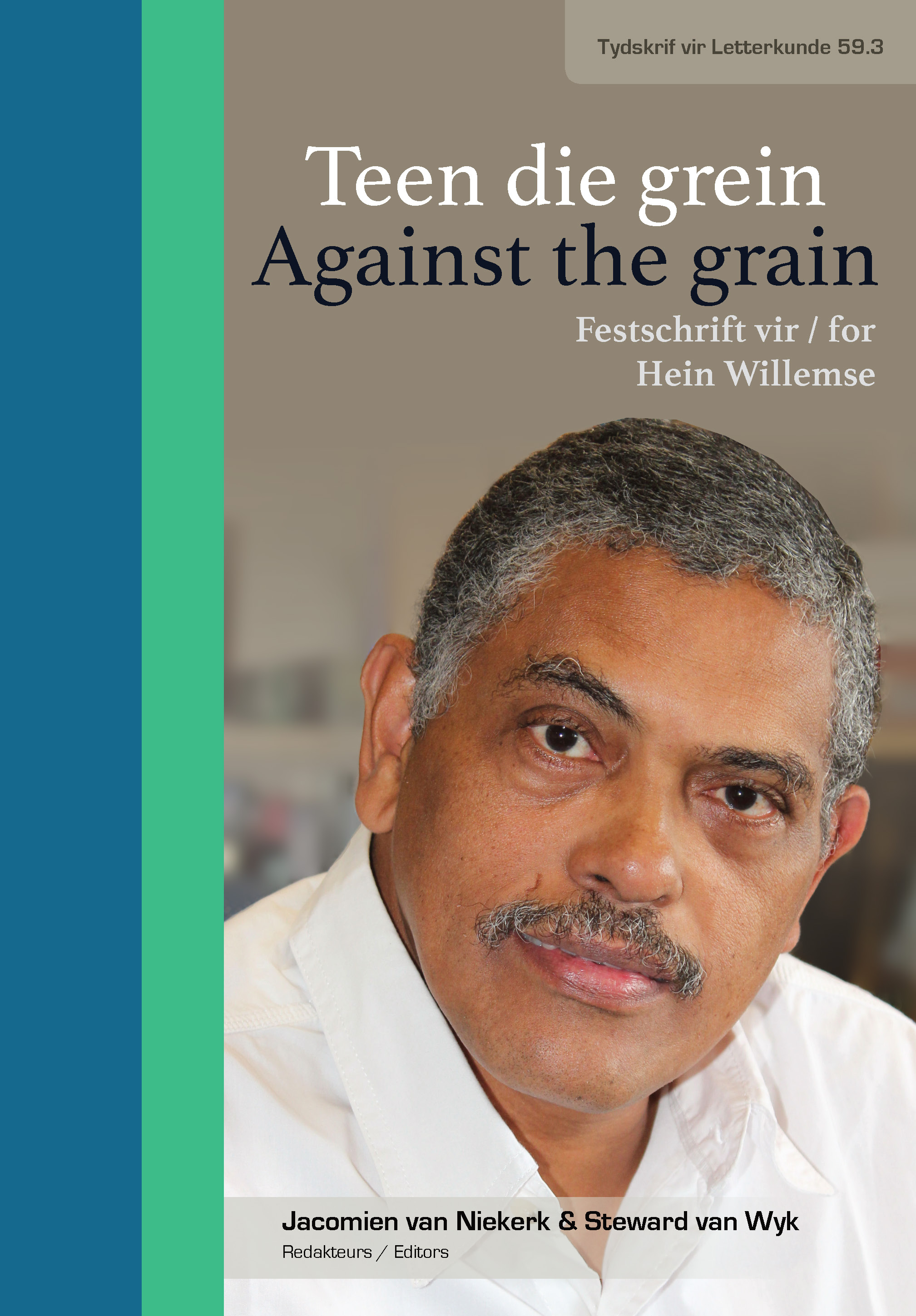Une écoute décoloniale : Hein Willemse, les histoires cachées et la politique de l'intervention perturbatrice
DOI :
https://doi.org/10.17159/tl.v59i3.13123Mots-clés :
écoute décoloniale, “ buitekanonisering ”, postcolonialisme, opposition conscienteRésumé
Dans cet article, nous abordons certaines des idées de Hein Willemse sur les histoires cachées, l’opposition consciente et la littérature qui se situent en dehors du canon traditionnel, qui ont commencé à fusionner suite aux appels contemporains pour des approches de décolonisation dans l’académie (sud) africaine. Si le tournant de la décolonisation a attiré l’attention sur les histoires partagées dans les contextes du Sud, c’est à travers les enseignements postcoloniaux de Willemse que nous avons compris l’importance et la signification de la récupération de l’espace ontologique africain perdu. Cet article se situe donc dans le cadre de la recherche postcoloniale et décoloniale dans le sens où il n’est pas guidé par une méthode particulière, mais plutôt par des questions qui ont émergé de contextes sociaux plus larges. Nous nous appuyons sur l’approche visionnaire de Willemse de l’importance des histoires cachées et de ce que cela signifie si on adopte un angle postcolonial et/ou décolonial. Cela nécessite, entre autres, une conscience aiguë de l’histoire, du patrimoine et des héritages, tant dans la société que dans le milieu universitaire. Nous intégrons une sélection aléatoire de son travail afin d’expliquer comment son intervention perturbatrice sert à reformuler l’idée de l’afrikaans et de la littérature afrikaans d’une manière plus inclusive pour ceux qui ont été réduits au silence par le projet de l’apartheid, y compris en Afrique et dans l’ensemble du Sud.
Téléchargements
Références
Adichie, Chimamanda Ngozi. “The Danger of a Single Story.” TED. Jul. 2009. https://www.ted.com/talks/chimamanda_ngozi_adichie_the_danger_of_a_single_story?language=en.
Ashcroft, Bill & Pal Ahluwalia. Edward Said. Routledge, 2009.
Ashcroft, Bill, Gareth Griffiths & Helen Tiffin. The Empire Writes Back. Routledge, 2002.
Asante, Molefi Kete & George Yancy. “Molefi Kete Asante: Why Afrocentricity?” The New York Times. 7 May 2015. https://opinionator.blogs.nytimes.com/2015/05/07/molefi-kete-asante-why-afrocentricity/.
Bates, Jordan. “Literary canons exclude works no matter how selective canon makers are.” 25 Apr. 2013. The Daily Nebraskan. http://www.dailynebraskan.com/culture/literary-canons-exclude-works-no-matter-how-selective-canon-makers-are/article_da83def2-ad43-11e2-b07a-0019bb30f31a.html.
Benjamin, Walter. Illuminations, edited by Hannah Arendt & translated by Harry Zohn. Fontana, 1973.
Brink, André P. Reinventing a Continent: Writing and Politics, 1982–1995. Secker & Warburg, 1996.
Clarke, John. “Stuart Hall and the theory and practice of articulation.” Discourse: Studies in the Cultural Politics of Education vol. 36, no. 2, 2015, pp. 275–86. DOI: http://dx.doi.org/10.1080/01596306.2015.1013247.
De la Tierra, Tatiana. “Aliens and others in search of the tribe in academe.” This bridge we call home: radical visions for transformation, edited by Gloria Anzaldua & AnaLouise Keating. Routledge, 2002, pp, 358–68.
Grosfoguel, Ramon. “The epistemic decolonial turn: Beyond political-economy paradigms.” Cultural Studies vol. 21, no. 2–3, 2007, pp. 211–23. DOI: https://doi.org/10.1080/09502380601162514.
hooks, bell. Yearning: Race, Gender and Cultural Politics. Between the Lines, 1990.
Jantjies. Jodi. “Why Suidooster is Important in My Colouredness Journey.” VannieKaap. 5 Oct. 2020. https://news.vanniekaap.com/opinion/why-suidooster-is-important-in-my-colouredness-journey/.
Mignolo, Walter. “Epistemic disobedience, independent thought and decolonial freedom.” Theory, Culture and Society vol. 26, no. 7–8, 2009, pp. 1–23. DOI: https://doi.org/10.1177/0263276409349275.
Nyamnjoh, Francis. “Decolonizing the University in Africa.” The Oxford Research Encyclopedia. Oxford U P, 2019. 1–36. oxfordre.com/politics.
Nyamnjoh, Francis. “Incompleteness: Frontier Africa and the Currency of Conviviality.” Journal of Asian and African Studies vol. 52, no, 3, 2017, 253–70. DOI: https://doi.org/10.1177/0021909615580867.
Opara, Ijeoma Nnodim. “It’s Time to Decolonize the Decolonization Movement.” 29 Jul. 2021. PLOS BLOGS: Speaking of Medicine and Health. https://speakingofmedicine.plos.org/2021/07/29/its-time-to-decolonize-the-decolonization-movement/.
Roy, Arundati. “Peace & The New Corporate Liberation Theology.” 2004 City of Sydney Peace Prize Lecture. CPACS Occasional Paper no. 04/2. Centre for Peace and Conflict Studies, U Sydney, 2004.
Said, Edward. Humanism and Democratic Criticism. Columbia U P, 2004.
Slack, Jennifer Daryl. “The theory and method of articulation in cultural studies.” Stuart Hall: Critical Dialogues in Cultural Studies, edited by Kuan-Hsing Chen & David Morley. Routledge, 2006, pp. 113–29.
Spivak, Gayatri Chakravorty. “Can the subaltern speak?” Marxism and the interpretation of culture, edited by Cary Nelson & Lawrence Grossberg. U of Illinois P, 1988, pp. 271–313.
Vázquez, Rolando. “Towards a Decolonial Critique of Modernity. Buen Vivir, Relationality and the Task of Listening.” Kapital, Armut, Entwicklung. Capital, Poverty, Development. Capital, Pobreza, Desarrollo. Dokumentation des XV. Internationalen Seminars des Dialogprogramms Nord-Süd, edited by Raúl Fornet-
Betancourt. Wissenschaftsverlag Mainz, 2012, pp. 241–52.
Willemse, Hein. “Aantekening by drie klein geskiedenisse.” Tydskrif vir Letterkunde vol. 47, no. 2, 2010, pp. 150–65. DOI: https://doi.org/10.17159/tl.v47i2.3093.
Willemse, Hein. Aan die ander kant: Swart Afrikaanse skrywers in die Afrikaanse letterkunde. Protea, 2007.
Willemse, Hein. “André P. Brink se bevrydende woord en dissidensie.” Tydskrif vir Letterkunde vol. 52, no. 2, 2015, pp. 210–4. DOI: http://dx.doi.org/10.4314/tvl.v52i2.16.
Willemse, Hein. “The hidden histories of Afrikaans.” Whiteness Afrikaans Afrikaners: Addressing Post-Apartheid Legacies, Privileges and Burdens. Mapungubwe Institute for Strategic Reflection (MISTRA), 2018. DOI: https://doi.org/10.2307/j.ctvh8qwz9.
Willemse, Hein. “’n Inleiding tot buitekanonieke Afrikaanse kulturele praktyke.” Perspektief en Profiel: ’n Afrikaanse literatuurgeskiedenis Deel 1, edited by Hennie P. van Coller. 2 nd edition. Van Schaik, 2016, pp. 73–91.
Willemse, Hein. “Jakes Gerwel (1946–2012).” Tydskrif vir Letterkunde vol. 50, no. 1, 2013, pp. 126–30. DOI: https://doi.org/10.4314/tvl.v50i1.10.
Willemse, Hein. “Om ruim in Afrika te leef.” Tydskrif vir Letterkunde vol. 40, no.1, 2003, pp. 8–22. DOI: https://doi.org/10.4314/tvl.v40i1.53612.
Willemse, Hein. “Outobiografie en herinnering as verset in Adam Small se The Orange Earth.” Tydskrif vir Letterkunde vol. 49, no. 1, 2012, pp. 70–81. DOI: https://doi.org/10.4314/tvl.v49i1.6.
Willemse, Hein. “Tokkelossie, ‘’n Boesman, outa Hendrik’ en ontkennende close readings.” Literator vol. 29, no. 3, 2008, pp. 57–73. DOI: https://doi.org/10.4102/lit.v29i3.125.
Willemse, Hein. “Towards the fullness of the Afrikaans language.” LitNet. 28 Aug. 2019. https://www.litnet.co.za/towards-the-fullness-of-the-afrikaans-language/.
Wright, Colin. “Centrifugal logics: Eagleton and Spivak on the Place of ‘Place’ in Postcolonial Theory.” Culture, Theory and Critique vol. 43, no. 1, 2002, pp. 67–82. DOI: https://doi.org/10.1080/14735780210143527.
Téléchargements
Publiée
Numéro
Rubrique
Licence
(c) Copyright Tydskrif vir Letterkunde 2022

Ce travail est disponible sous licence Creative Commons Attribution - Partage dans les Mêmes Conditions 4.0 International.


 https://orcid.org/0000-0001-6465-6584
https://orcid.org/0000-0001-6465-6584


.png)